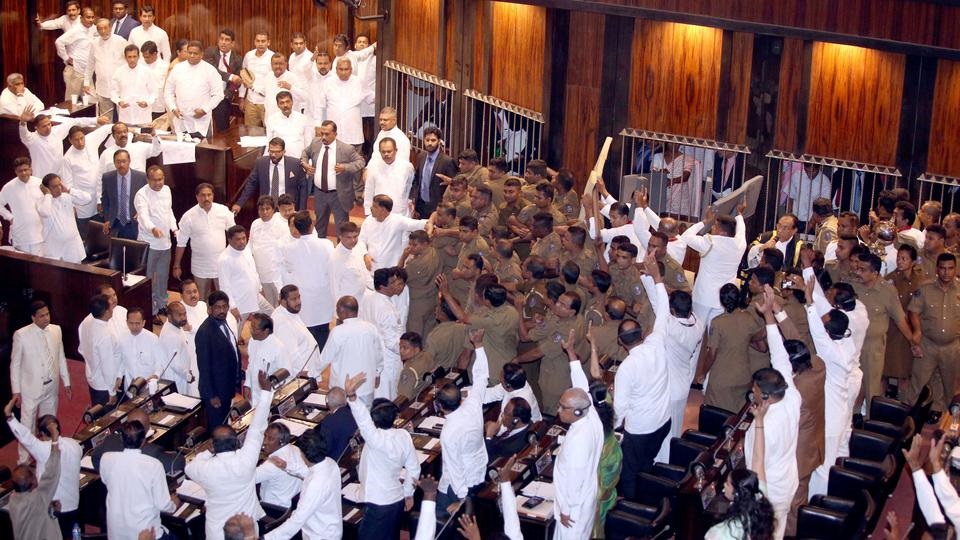Image: MPs supporting disputed prime minister Mahinda Rajapaksa threw books and chairs at police who escorted Speaker Karu Jayasuriya into the chamber and did not allow him to sit in the speaker’s chair. (November 16, 2018) (Reuters)
All members of the Sri Lanka parliament has ignored a official letter from the PA [ Parliamentary Assistant?] requesting them to furnish their education qualifications for last two months. The request was made as a result of the mediation by RTI commission with right to information appeal by a citizen.
Parliament information officer has further informed the appellant that parliament does not have information on any criminal charges leveled against the members of the parliament.
Countering the argument of the Parliament information officer that education qualification of members of the parliament are private information the RTI commission says that ” We emphasize the paramountcy of this information being available to the citizenry. As
pointed out by the Indian judiciary, “a successful democracy posits an „aware‟ citizenry”
[Vide Union of India v Association for Democratic Reforms(Supra)] for which purpose, the
said information is of high public interest.As such,it is our view that it is incumbent on the
PA to takerequisite steps to obtain the said information from elected representatives of the Sri Lanka Parliament and to make the same available of public record.”
The ruling of the RTI commission says that:
“Steps taken by the PA to obtain information relating to the educational qualifications of MPs Proceeding on the basis that the requested information is not currently within the possession, custody or control of the PA in terms of Section 3 (1) of the Act, it is encouraging to note that the PA has taken the first steps in this regard by writing to all Members of Parliament (MPs) by letter dated 10.05.2021 to obtain information on the relevant educational qualifications, citing requests for information made by citizens under the RTI Act. However, the PA has affirmed before this Commission that not a single MP had responded to the said request to date.
“The absence of any response even after the lapse of more than two months since the aforesaid letter is undeniably a matter for concern in the context of the overriding public interest as referred to in this Order. The Commission directs the PA to apprise the Appellant forthwith of any responses to the above stated letter, with copy to the Commission. We further note that, contingent on the said information being furnished, the PA has undertaken to update their website with the educational qualifications of MPs albeit without a specified timeline.”
The information request was made by S. Rubatheesan on 01 January 2021.
- Rubatheesan v Sri Lanka Parliament
11.What are the educational qualifications of the members of the current Parliament, especially the ministers?
12.How many MPs have criminal charges against them?
Upon the PA refusing the information release on the basis that it does not have the information under Section 3 (1) of the RTI Act in that the Sri Lankan Constitution does not require it to collect that information, that in accordance with the said Articles, Members of Parliament are “not bound to provide any such information to the Parliament” and also that it constitutes ‘private information’
By letter dated 10th May, 2021, the Secretary General of Parliament has taken steps to write to all Parliamentarians, stating inter alia that “if you are willing to provide this information, you are kindly requested to furnish me your educational and professional qualifications on the attached specimen as early as possible enabling to disseminate such information to the requests of the citizens” but that no response was recieved to date.
Order of Commission on Appeal
We rule that the information asked for does not come within the ambit of Section 5 (1)(a) in that firstly, it has a direct relationship to ‘public activity or interest’ within the meaning of that Section and secondly, as a consequence thereof that, there is no ‘unwarranted’ invasion of privacy thereby. It is of direct comparative interest that in Union of India v Association for Democratic Reforms [2002], the Indian Supreme Court held that constituencies have a right to know about interalia the educational qualifications and criminal charges, if any, of elected representatives, as this is an exercise which furthers the citizens’ right to make an informed decision about who should represent them in Parliament.
…In any event, the public interest in disclosure of the said information is paramount as envisaged in Section 5 (4) of the RTI Act,
…Proceeding on the basis that the requested information is not currently within the possession, custody or control of the PA in terms of Section 3 (1) of the Act, it is encouraging to note that the PA has taken the first steps in this regard by writing to all Members of Parliament (MPs) by letter dated 10.05.2021 to obtain information on the relevant educational qualifications, citing requests for information made by citizens under the RTI Act. However, the PA has affirmed before this Commission that not a single MP had responded to the said request to date.
…The absence of any response even after the lapse of more than two months since the aforesaid letter is undeniably a matter for concern in the context of the overriding public interest as referred to in this Order. The Commission directs the PA to apprise the Appellant forthwith of any responses to the above stated letter, with copy to the Commission. We further note that, contingent on the said information being furnished, the PA has undertaken to update their website with the educational qualifications of MPs albeit without a specified timeline.
…Further, it our view that it is incumbent on the PA to take requisite steps to obtain the requested information regarding pending criminal charges from elected representatives of the Sri Lanka Parliament and to make the same available of public record.
